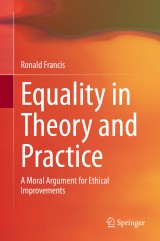Details

Equality in Theory and Practice
A Moral Argument for Ethical Improvements|
117,69 € |
|
| Verlag: | Springer |
| Format: | |
| Veröffentl.: | 15.06.2020 |
| ISBN/EAN: | 9789811534881 |
| Sprache: | englisch |
Dieses eBook enthält ein Wasserzeichen.
Beschreibungen
<p>This book is an account of the concept of equality from the perspective of both theory and practice, and presents methods of quantifying values. It considers both arguments and evidence, and tackles equality in its different forms, including economic equality, education, equality before the law, equality of opportunity, and gender equality. The book shows that inequality is a profoundly moral question, noting that there are good practical reasons for its adoption. It presents a consideration of classical theories from Aristotle to Hume, as well as contemporary approaches such as those offered by Rawls, Haidt, Temkin, and Parfit. It also contemplates issues such as the naturalistic fallacy, and considers what is different about the Goleman view of moral sensitivity and the ethical personality. The array of evidence includes the impact of climate and various plants such as sugar and cotton on the slave trade, the concept of Gaia, Darwinism, sex inequality, personality, culture, psychological issues, and the quantification of ethics. The book concludes with some practical suggestions for improving equality. It aims to raise awareness of the ways in which equality can be understood, and achieved. It will be relevant to students and scholars in philosophy, human rights, and law.</p><br><p></p>
<div>Title page.-Chapter summaries.-Abstract.-Acknowledgements.-Dedication.-MS (Chapters).-References.-Index.-Appendix.</div><div><br></div>
<div>Ronald D Francis is an emeritus professor in the College of Law and Justice at Victoria University in</div><div> Melbourne, Australia. He received his first degrees at Canterbury, Christchurch, completed a PhD in experimental psychology at the University of Melbourne and the Post Graduate Diploma in Criminology at Cambridge. He has worked in several universities in Victoria and NSW and has held several Visiting Fellowships at Cambridge He has been supervisor of a number of doctoral candidates. Additional experience includes years as a Justice of the Peace with Bench experience, appearance in court as an expert witness, three years as Chairman of a national ethics committee and ten years on the Victorian Department of Justice, Research Ethics Committee. Has also been a co-recipient of an ARC research grant, as well as other grants. </div>
<p></p>This book is an account of the concept of equality from the perspective of both theory and practice, and presents methods of quantifying values. It considers both arguments and evidence, and tackles equality in its different forms, including economic equality, education, equality before the law, equality of opportunity, and gender equality. The book shows that inequality is a profoundly moral question, noting that there are good practical reasons for its adoption. It presents a consideration of classical theories from Aristotle to Hume, as well as contemporary approaches such as those offered by Rawls, Haidt, Temkin, and Parfit. It also contemplates issues such as the naturalistic fallacy, and considers what is different about the Goleman view of moral sensitivity and the ethical personality. The array of evidence includes the impact of climate and various plants such as sugar and cotton on the slave trade, the concept of Gaia, Darwinism, sex inequality, personality, culture, psychological issues, and the quantification of ethics. The book concludes with some practical suggestions for improving equality. It aims to raise awareness of the ways in which equality can be understood, and achieved. It will be relevant to students and scholars in philosophy, human rights, and law.<br>
A highly original work by a leading legal scholar, bringing a multifaceted and nuanced perspective to the topic of equality Provides a detailed and expansive review of literature relating to quantifying ethics Makes novel recommendations in both theory and practice for improving equality
This book is an account of the concept of equality from the perspective of both theory and practice, and presents methods of quantifying values. It considers both arguments and evidence, and tackles equality in its different forms, including economic equality, education, equality before the law, equality of opportunity, and gender equality. The book shows that inequality is a profoundly moral question, noting that there are good practical reasons for its adoption. It presents a consideration of classical theories from Aristotle to Hume, as well as contemporary approaches such as those offered by Rawls, Haidt, Temkin, and Parfit. It also contemplates issues such as the naturalistic fallacy, and considers what is different about the Goleman view of moral sensitivity and the ethical personality. The array of evidence includes the impact of climate and various plants such as sugar and cotton on the slave trade, the concept of Gaia, Darwinism, sex inequality, personality, culture,psychological issues, and the quantification of ethics. The book concludes with some practical suggestions for improving equality. It aims to raise awareness of the ways in which equality can be understood, and achieved. It will be relevant to students and scholars in philosophy, human rights, and law.<br>

















